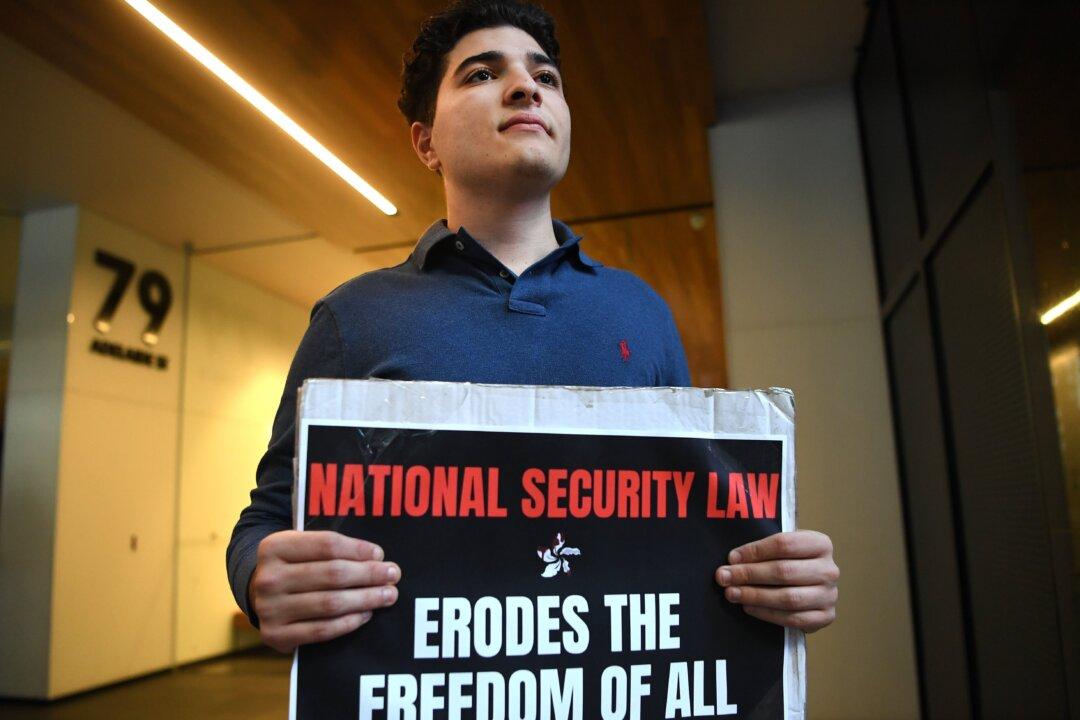The Australian government has confirmed it is providing consular assistance to human rights activist Drew Pavlou after he was arrested in the UK on July 21 for allegedly issuing a fake bomb threat to the Chinese Embassy in London.
The Australia Department of Foreign Affairs and Trade confirmed to The Epoch Times in an email it was assisting Pavlou.
“The Department of Foreign Affairs and Trade is providing consular assistance to Drew Pavlou, an Australian who was arrested and subsequently released in the United Kingdom,” a spokesperson said, noting that due to privacy concerns they could not provide further details.
Pavlou was arrested during a small protest outside the Chinese Embassy in London and claimed he had been set up by Beijing.
Pavlou also alleged he was held in a cell incommunicado for 23 hours by London Metro police who supposedly denied him access to Australian consular authorities.
“They pressured me to hold [an] interview without lawyers present, I was only allowed one 5-minute monitored phone call after 20 hours. They seized my phone and said I can’t leave the country, I face a SEVEN YEAR PRISON SENTENCE,” he wrote in a thread on Twitter.
Additionally, Pavlou said that the UK police pressured him into surrendering his phone password by threatening to charge him “with crimes related to obstructing investigation which carry [sic] a further 5-year prison sentence.”
A Common Tactic Used to Silence Dissent
In response to Pavlou’s arrest, Amnesty International wrote to Australia’s Foreign Minister Penny Wong saying he was a victim of a common tactic deployed by Beijing against critics.“Mr. Pavlou believes the fake email address was designed to frame him for his activism. According to his lawyer, circumstantial evidence suggests his client is a victim of a set-up by the Chinese state.”
Amnesty said they were also concerned about Pavlou, who has received many death threats and threatening messages since news of his arrest and the alleged bomb threat became public knowledge.
“We urge the Australian government to offer Mr. Pavlou every assistance for his safe return to Australia as quickly as possible and ensure his fundamental rights are protected, particularly given the claims made about how he was treated during the arrest and detention,” they said.
“We uncovered the identity of the bloke who sent me the death threat voice recordings–young British guy who studied Chinese at university, now works at a Beijing think tank with strong links to senior CCP officials as well as the Ministry of State Security. Police have his name,” Pavlou wrote.
Arrest Galvanises Anti-CCP Activists
Meanwhile, Pavlou’s arrest has galvanised human rights activists around the world, with British advocate Benedict Rogers, chief executive of Hong Kong Watch and cofounder of the Conservative Party Human Rights Commission, taking to Twitter to call Pavlou’s arrest a “totally absurd and outrageous injustice.”Rogers praised Pavlou as a “totally peaceful young man who heroically devotes his energies to highlighting” the human rights atrocities in Xinjiang and Tibet, the dismantling of Hong Kong’s freedoms, and CCP repression.
“He should be applauded, not arrested,” Rogers wrote.
Lucas, in his complaint, notes that London police should not have pressured the activist into handing over the password to his phone with threats of being jailed.
“People who are living in China, who are in contact with activists abroad, face life-threatening risks if their identities become known,” Lucas said. “The metropolitical police should be protecting him rather than acting as accomplices in his harassment.”




